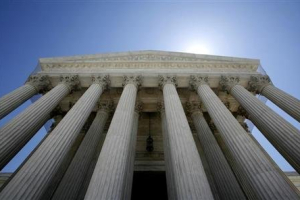Some top profile Republicans have signed a legal brief that supports a lawsuit aiming to bringing down Proposition 8, the California ballot that received a majority vote in 2008 banning same-sex marriage.
The New York Times reported on Monday the existence of this friend-of-the-court, or amicus, brief that was organized by Ken Mehlman, a former chairman of the Republican National Committee who is gay. The legal document will be filed on Thursday.
The list of signatures included former Utah governor and presidential candidate Jon Huntsman, former California gubernatorial candidate Meg Whitman, former George W. Bush national security adviser Stephen Hadley, former George W. Bush Commerce Secretary Carlos Gutierrez, former George W. Bush Justice Department official James Comey, Ronald Reagan budget director David Stockman, former campaign adviser Steve Schmidt, former Congresswoman Deborah Pryce, former New Jersey Governor Christine Todd Whitman, and former Massachusetts Governor's William Weld and Jane Swift.
The lawsuit against Prop 8 will be heard alongside another case that seeks to overturn the 1996 federal Defense of Marriage Act (DOMA), which defines ‘marriage’ as the union between a man and a woman as husband and wife, and the word 'spouse' refers only to a person of the opposite sex who is a husband or a wife.
DOMA was introduced by Georgia Representative, then a Republican, to ensure that states or Federal government do not need to recognize same-sex marriage even if some states do. In 1996, the act was passed by Congress, signed by President Clinton and endorsed by the Republican Party. It has been quoted against legalization of same sex marriage in various states, and conservatives view this act as the last line of defense for protecting the traditional concept of marriage.
In 2011, President Obama supported the repeal of DOMA, and instructed his Justice Department not to defend it in court. In response, House speaker John A. Boehner and House Republican leadership authorized the use of tax dollars to defend the law; Mr. Boehner said it is up to the Supreme Court, not the Obama administration, to determine the constitutionality of the measure, according to New York Times.
Last week, the administration filed its brief, asking the Supreme Court to rule DOMA as unconstitutional. The brief argues that it is “a harsh form of discrimination” towards same-sex couples who may already legally marry in some states.
Stanford constitutional law professor Jane Schacter told ABC News in this case it could be an “influential brief” because it “telegraphs to the court that there is an increasing number of people who support same sex marriage and that it is no longer a partisan issue to the extent that it was.”
“When this number of Republicans is saying it’s an issue where there should be equality it changes the way it looks to the justices,” Schacter said, according to ABC News.
Meanwhile, the conservatives have filed their own amicus briefs to the Supreme Court in support of the federal DOMA and California’s Prop 8.
According to Catholic World Reports, the U.S. Conference of Catholics filed its brief on January 29, which argues that societal ills that stem from dissolution of marriage and family would “only be aggravated” were the government to fail to reinforce marriage as defined by DOMA with the “unique encouragement and support it deserves.”
Moreover, USCCB notes that a judicial decision, instead of legislative process, invalidating Prop 8’s definition of marriage would have adverse consequences in other areas of law. Not only will it threaten principles of federalism and separation of powers, but would cause adverse impact on other constitutional rights, such as freedom of religion, conscience, speech, and association.
The brief states the judgment would create an “engine of conflict in this area”, which would embroil the courts in avoidable disputes – “pitting constitutional right squarely against constitutional right – for years to come.”
According to the Christian Post, Robert P. George, McCormick professor of jurisprudence at Princeton University, has said, “Everything depends upon marriage, because it is the fundamental unit of society, the original and best department of health, education and welfare, supplying what every other institution in society needs, depends on, for its own flourishing, but which none of those institutions can supply for themselves.”



















